
views
X
Trustworthy Source
Mayo Clinic
Educational website from one of the world's leading hospitals
Go to source
In short, there are other approaches that are probably safer.[2]
X
Research source
If you do decide to use aloe vera to treat your constipation, take it in very small quantities and don't use it for more than a week.
Aloe as a Remedy
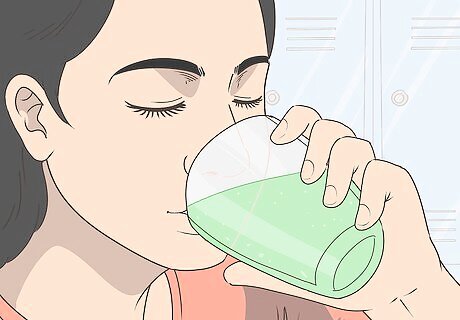
Drink a small amount of aloe juice for its mild laxative effects. Aloe juice is sometimes sold in health food stores with other plant-based drinks like coconut water. When you drink it, it may have a mild laxative effect, so you might get some relief from your constipation. Just make sure you choose a drink that's labeled as aloin-free, which means it's been filtered to remove the compound that can irritate your stomach. There's no set amount of aloe juice to drink for constipation or any time-table for how often you should take it. If you do drink aloe juice, start with a small serving, then wait several hours to ensure you don't experience any negative side effects.
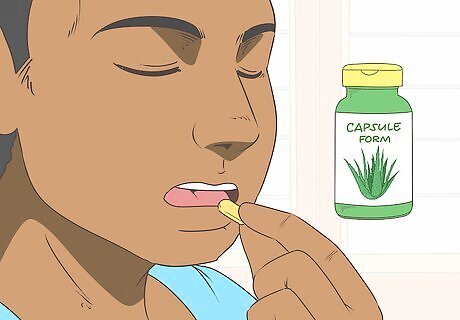
Avoid aloe latex capsules just to be safe. Aloe that's sold in capsule form may be made from either the latex (the green leafy part of the plant that acts as a laxative) or the whole leaf. Either way, these tend to be stronger than aloe juice—anywhere from 10-100 times stronger. These capsules could cause serious health problems, though, so you're probably better off choosing a safer remedy for your constipation. If you do choose to take aloe capsules, start with the smallest dose recommended on the packaging, and never take more than the maximum recommended dose.
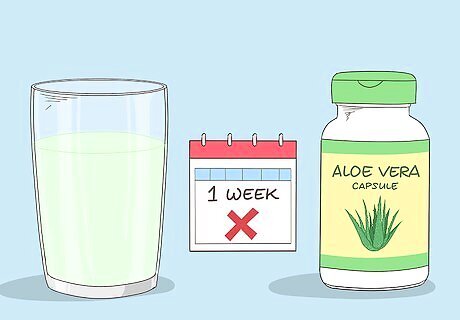
Do not use aloe to treat constipation for more than 1 week. If you take aloe for even a few days, it could lead to serious health problems, including kidney damage or even death. If you're taking aloe and your constipation lasts longer than a week, talk to your doctor or try a different remedy. Also, don't take more than 1g of aloe in a single day, as higher doses increase your risk of developing health problems. Don't give aloe vera orally to children who are under the age of 12.

Talk to your doctor about possible drug interactions. If you're currently under treatment for any condition, talk to your doctor before you take aloe for constipation. Taking aloe can increase the side effects or decrease the effectiveness of any oral medications. There are also some specific medications that aloe might have negative interactions with, including: Anticoagulants—both anticoagulants and aloe can slow blood clotting Digoxin—may decrease your potassium, increasing the side effects of Digoxin Warfarin—could lead to risk of bleeding Diabetes drugs—could increase your risk of hypoglycemia Sevoflurane (an anesthetic)—could increase your risk of severe bleeding during surgery Stimulant laxatives—may overstimulate your bowels Water pills—could lead to severe dehydration and decreased potassium levels

Call your doctor if you have severe side effects. Aloe vera can cause stomach pain and diarrhea. These may improve on their own, but if they become severe, or if you're vomiting or you experience seizures, call your doctor or visit the emergency room. Aloe may also lead to low potassium. If your potassium is low, you might have muscle cramps, and in severe cases you might experience paralysis, an abnormal heartbeat, or kidney damage. Also watch for symptoms of liver damage, which may include jaundice, severe abdominal pain, and dark urine. You might also notice that you bruise easily. If your constipation causes you to have severe pain or if you notice blood in your stool, go to the emergency room right away.
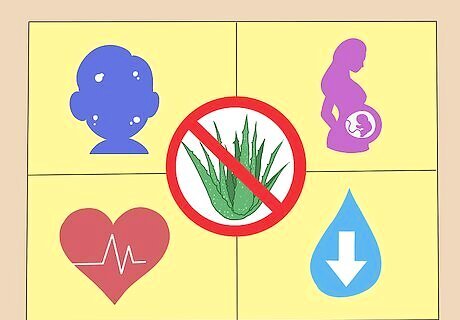
Don't take aloe if you have certain allergies or health conditions. In some cases, you might have conditions that make it even more dangerous to use aloe vera for constipation. For instance, you may be allergic to aloe if you're allergic to plants from the Liliaceae family, including garlic, onions, or tulips. In that case, you shouldn't use aloe topically or orally. Also, don't take aloe vera orally if: You are pregnant, as it could cause your baby to develop birth defects or could even lead to a loss of pregnancy. If you have renal or cardiac disease, as dehydration can lead to low potassium and other health complications.

Consider cascara or senna as an alternative. If you want to try a remedy similar to aloe, consider taking cascara or senna supplements instead. They're from the same family, but the side effects typically aren't as harsh. Cascara is usually sold in tablet form. Take 300 mg once a day, and do not take it for longer than 6 days. Senna is sold as tablets and chewable tablets, as well as in liquid and powder form. Dosing will depend on the type of senna you choose.
Foods that May Ease Constipation

Drink more fluids. Everyone's fluid needs are different, but in general, women need about 11.5 cups (2.7 liters) and men need about 15.5 cups (2.7 liters) each day. If you're being active—or if you're already drinking this much and you're still constipated—you might need to drink even more. Water and fruit juices—especially pear, white grape, and prune juice—are best for helping relieve constipation. Warm beverages can sometimes help ease constipation. Try drinking a cup of coffee or hot tea first thing in the morning to help get your bowels moving. A little caffeine can be helpful, but too much can make it harder to go. Also, limit how much alcohol you drink, as it can dehydrate you.

Include fruits in your diet to increase your fiber. The natural sugar and fiber in fruits can help you have a bowel movement. If the fruit you're eating has a skin on it (like apples), be sure not to peel it—there's a lot of fiber there that you don't want to miss out on! A few good options include apples, strawberries, figs, raising, and pears. It's not just an old wives' tale—prunes really can help you go! They have a lot of fiber and sugar, which can help bulk up your stool.
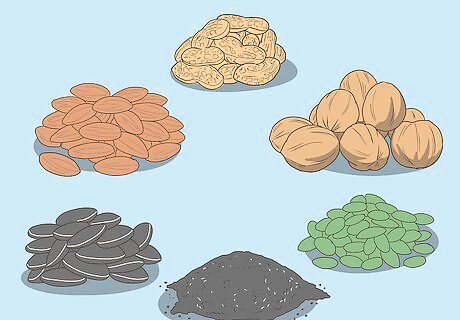
Snack on high-fiber nuts and seeds. In addition to all of their other health benefits, nuts and seeds are high in fiber. Grab a handful of your favorite snacks to help naturally relieve your constipation. Try unsalted peanuts, almonds, or walnuts, for instance, or snack on some pumpkin, chia, or sunflower seeds.

Eat vegetables several times a day. Veggies are a great source of natural fiber. Leafy greens are especially helpful when you're constipated, but there are tons of other options as well. At every meal, make sure you include a serving of something like: Brussels sprouts Peas Beans Broccoli Sweet potato
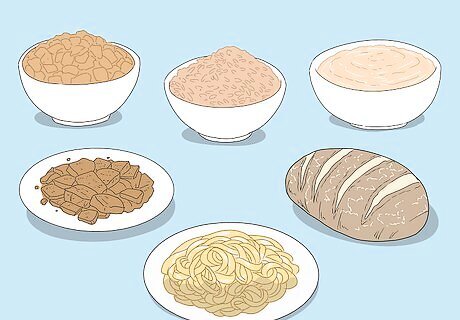
Opt for whole-grain, fiber-rich carbohydrates. When it comes to fiber, it doesn't get much better than whole grains. Just make sure to avoid refined carbs and foods that are high in sugar, can actually make the problem worse. Some good options include: Brown rice Oatmeal Bran cereal Whole grain pasta and bread

Include oils in your diet to help make it easier to go. Eat 2–3 US tbsp (30–44 ml) of soybean, safflower, or vegetable oil each day. That will help lubricate your bowels, which can help make it easier to pass a stool. You can just take the oil by the spoonful, or if you prefer, you could mix it with some herbs and lemon juice and use it as a salad dressing. That's a great way to get those leafy greens—and you can use some veggies, nuts, and seeds as salad toppings, too!
Lifestyle Remedies for Constipation Relief

Get up and moving. Even if you're feeling sluggish and bloated, do your best to get active. If all you can manage is a walk around the block, do that! Physical activity can help get your bowels moving again, which may help you pass your stool. In general, try to get about 30 minutes of physical activity each day. Dancing, swimming, and light cardio can also help.

Eat at regular times throughout the day. Try to eat at the same time each day. When you eat, it naturally stimulates your bowels. If you get into a normal eating routine, it might make it easier to go to the bathroom at the same time each day, as well. Sometimes, it's easier to pass a bowel movement right after you eat, so consider having your breakfast a little earlier each day—that way, you won't be rushed if you need to go in the morning.
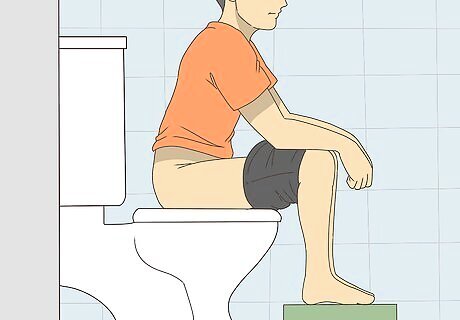
Use a squatting position on the toilet. When you're going number two, try sitting slightly forward like you're crouching over the toilet. This is a more natural position that can help relax your bowel muscles so you don't have to strain as hard. If that's not comfortable, prop your feet on a small stool so your knees are lifted up above hip level.

Get into a regular bathroom routine. Try to make it a habit to go to the bathroom at the same time every day. Even if you don't think you have to go, sit on the toilet for a few minutes to see if you have the urge. Over time, this can help you train your body to have a bowel movement at the same time each day—which ultimately will make it easier to go. Never ignore the urge when you have to go to the bathroom. The longer the stool is in your intestines, the harder it will be to go later on.
Proven Remedies

Take fiber supplements for a gentle, long-term remedy. If you're not getting enough fiber in your diet, try taking a fiber supplement. Fiber adds bulk to your stool, which can make it easier to pass. Fiber supplements are typically safe to use every day, so they're a good option if you experience chronic constipation. Opt for a supplement with mostly insoluble fiber, which is more likely to ease constipation without causing gas and bloating. Fiber supplements with methylcellulose are mainly made with insoluble fiber. Supplements with psyllium husk contain both soluble and insoluble fiber, and may also be a good option.

Try a stool softener for a mild solution. Stool softeners make it easier for water to mix into your stool. This can help make it easier to have a bowel movement without straining. This is a fairly gentle option, as it doesn't actually affect your digestive tract, so it's a good idea to try this before you try laxatives. Over time, it's possible to develop a tolerance to stool softeners, so you may need to use a higher dose. However, they're generally safe to use over long periods of time. Stool softeners are typically available over-the-counter. They commonly include the active ingredient docusate sodium.

Use lubricant laxatives to help pass stools easier. Lubricant laxatives coat your intestines in an oily substance. This helps the stool slide out more easily, and it usually works in just a few hours. Mineral oil is a well-known lubricant laxative. Don't take these for more than a week at a time, as it could lead to vitamin deficiencies. Lubricant laxatives can affect how some medicines are absorbed, so talk to your doctor before you take them if you're being treated for any conditions. Also, it's not safe for women who are pregnant.
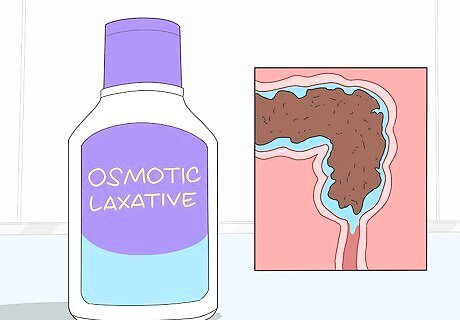
Take an osmotic laxative if gentle remedies aren't working. Osmotic laxatives work by drawing water into your intestines, which helps soften your stool. Eventually, this will make it easier to go. However, you may need to be patient: it can sometimes take 2-3 days for osmotic laxatives to work. These can sometimes cause mild side effects like bloating, nausea, and gas. They may also lead to dehydration, since they draw water from other parts of your body. Citrate salts and magnesium are examples of osmotics.

Talk to your doctor before using stimulant laxatives. Stimulant laxatives are fairly strong—they work by causing the muscles in your digestive system to contract, which can help push out your stool. They usually work in about 6-12 hours. However, since they're strong, they should only be used if no other treatments have worked, and only with the approval of your doctor. Don't take stimulant laxatives long-term. They can cause your colon to stop functioning correctly, which can lead to a dependence on the laxatives. Don't take stimulant laxatives if you're pregnant. Castor oil, senna, and bisacodyl are stimulant laxatives.

















Comments
0 comment